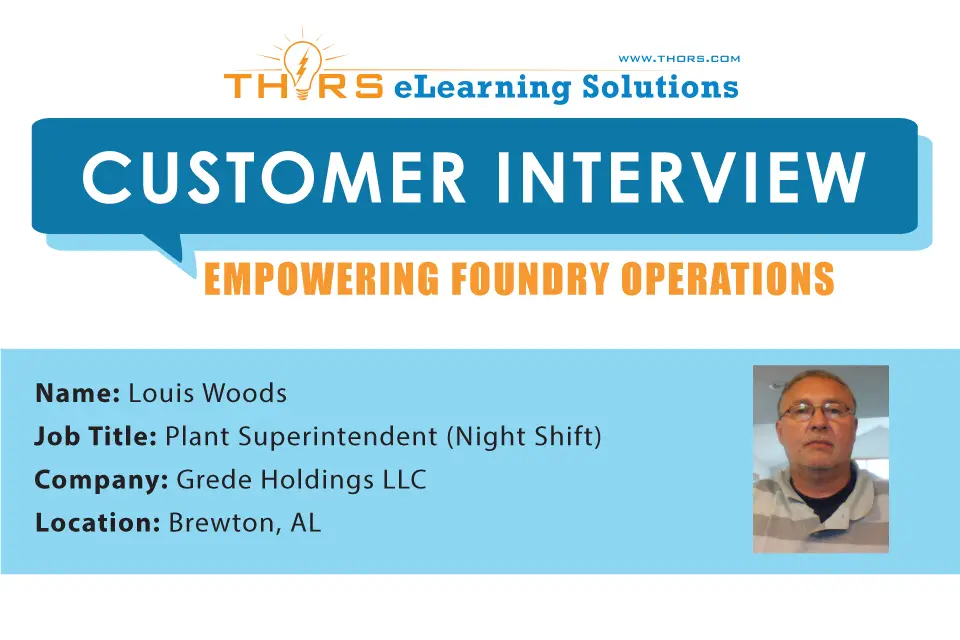What are your day-to-day responsibilities?
I am responsible for the entire plant at night, i.e. 5 pm to 5 am. I work on staffing the core room, checking the molding plant and making sure that the molding and finishing schedules match. I am also responsible for the general safety and the availability of the molding and melting processes. I check the sand system and make sure all of our numbers look good. Throughout the night I make rounds of the plant to make sure everything is working correctly.
What are the key challenges you face in your job?
Fixing the scrap is one of my biggest challenges. The temperature and humidity change during the night causes the sand to behave differently.
Tell us about your professional background.
I served in the Navy as an electrician. After that, I went to Waupaca Foundry and worked there for 20 years where I ran an electrical crew. Later, at Neenah Foundry, I was electrical supervisory for Plant III. Last year, Grede called and I have been working here since June 2014.
What training programs did you complete prior to THORS? Have you taken any Foundry related courses before?
Not really. I took all my classes in management, electrical and maintenance but not courses specializing in foundry-related topics.
How and why did you start the THORS training program?
Randy Hunt (Quality Engineering Manager at Grede LLC) actually wanted five of us (employees) to take the course. Basically, they were trying to train supervisor level candidates and since I came out of maintenance and I didn’t have a lot of exposure he wanted me to take the course along with the others. We were meant to gain exposure on how a sand system worked and how it affected all of our parts.
How much time did you spend every day/ week on this program? Did you learn at home or at work?
I did it whenever I had an opportunity. I also spent some time in our lab/control room where we do all our sand testing. When I had time I would spend half an hour (taking the course) and then to go to the lab and have the guys in the lab show me how it actually worked. It was nice to read something and go up there and to put everything to use. I spent around 40 hours on this course. I did it both at home and at work. That’s why it is nice, because you can log in wherever you are. I would log on to the course at the airports because I was travelling at that time. When you have free time you can start reviewing stuff.
What is the value you got out of the program? Did it make your job easier? Do you approach your tasks differently?
"Now if we have a problem that could be sand related, I just refer to the course and get suggestions from the course to fix it. It helps me go in the right direction."
Louis Woods, Plant Superintendent | Grede Holdings LLC
Before, I was kind of guessing. This narrowed it down and I wasn’t looking at a whole bunch of things. It (the course) gives you three or four reasons for what it (the problem) could have been and then I could at least ask intelligent questions to try to get the answer we needed to why we have scrap on a particular day. I honestly think it helped me a lot because I now understand when people are trying to tell me something or when they have absolutely no clue. Now I know I am on the right direction when trying to solve a problem. My approach to problem solving is now way different than what it was before.
If there is a value you got out of the program – can you measure it in terms of job efficiency?
I am 20% more efficient at my job now, after I took the THORS course. I am not trying to guess anymore. It is like an educated guess but at least I am not chasing anything that has nothing to do with the problem itself.
If you had this program when you first started your career 30 years ago, what difference would it have made?
I can answer this for the maintenance side and the production side as I have worked in both. It helps if workers on either side understand things like temperature control, mulling, moisture control, etc. because this stuff has to be taken care of. You can’t let your sand out of control at any stage. Most of the workers don’t understand this like they should. So, it would have made a huge impact on sand production and maintenance if this was available 30 years ago.
On a scale of 1 to 10, how likely would you recommend this product to a colleague, friend or another foundry employee
I would give it a 10! I would also like to see a similar course on Ductile Iron chemistry



